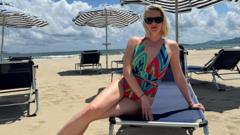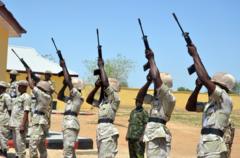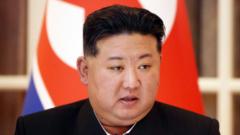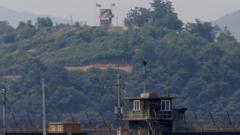Anastasia Samsonova's recent trip to North Korea's Wonsan Kalma Resort reveals a unique yet tightly regulated tourist experience as the country reopens its borders cautiously. This article explores the dynamics of this new destination amid geopolitical realities, the contrast between the surreal experience and North Korean realities, and insights from travelers navigating this unusual locale.
The Intriguing Allure of North Korea's Wonsan Kalma Resort: A Journey Beyond Borders

The Intriguing Allure of North Korea's Wonsan Kalma Resort: A Journey Beyond Borders
Tourists from Russia discover North Korea's Wonsan Kalma, where stunning beaches meet strict regulations and a curious blend of leisure and caution.
Anastasia Samsonova's visit to North Korea’s newly opened Wonsan Kalma Resort, often referred to as "North Korea's Benidorm," highlights a striking blend of stunning landscapes and stringent regulations. As part of a select group of tourists, there were distinct reminders of the isolation that characterizes life in the hermetic state, exemplified by the presence of security personnel guiding their every step.
Opened on July 1, the resort lies on North Korea’s eastern coast, an area synonymous with leader Kim Jong Un's early years. Despite its initial promise of welcoming international tourists, access has been limited primarily to groups from Russia, organized through accredited travel agencies, post-COVID-19 pandemic restrictions. This invites comparison with Wonsan Kalma’s Spanish counterpart—Benidorm—known for its vibrant, tourist-friendly atmosphere.
Anastasia and her group were escorted everywhere, as North Korean guides emphasized the necessity of supervision to avoid startling locals who have not seen foreigners in a long time. This factor underscores the controlled nature of interactions within the country. Anastasia recounted that local residents expressed astonishment at their presence, further amplifying the surreal nature of their experience amid a backdrop of strict itineraries and decisive regulations.
Among the rules were prohibitions on photographing construction sites, restrictions on swimwear choices, and a constant reminder about maintaining decorum while on the beach. Oddly, despite these controls, Anastasia described the resort's beaches as impeccably maintained and largely deserted, allowing for an exclusive vacation experience devoid of crowds.
While the resort promises a unique experience, it also raises questions about labor practices and human rights, as reports have surfaced regarding the treatment of workers involved in the construction and maintenance of the facilities. Human rights organizations criticize the harsh conditions under which many forced laborers work, heightening ethical concerns amidst the allure of tourism.
Since opening, the travel agency Vostok Intur has facilitated several trips to Wonsan Kalma, with future excursions steeped in uncertainty due to the North Korean government's tight regulation of tourism. The travel history into North Korea reveals a continuing struggle, even for neighboring allies like China, to access this secluded tourist venture, raising issues about the country’s broader intentions concerning foreign interactions.
Amidst these restrictions and challenges, the resort is part of Kim's overarching ambition to revitalize North Korea’s economy through tourism. However, as demonstrated in Anastasia's narrative and the commentary from travel industry experts, the limits on foreign tourism are set against a backdrop of tightly controlled narratives designed to prevent locals from comparing their lives with those of visitors.
Despite the intricate complexities surrounding her visit, including work conditions and strict guidelines, Anastasia expressed a desire to return, illustrating a continually evolving and often contradictory tourism landscape in North Korea. The prospect of future developments at Wonsan Kalma, alongside possible expansions into ski resorts, reflects a blend of curiosity, caution, and intrigue surrounding this enigmatic destination.
















